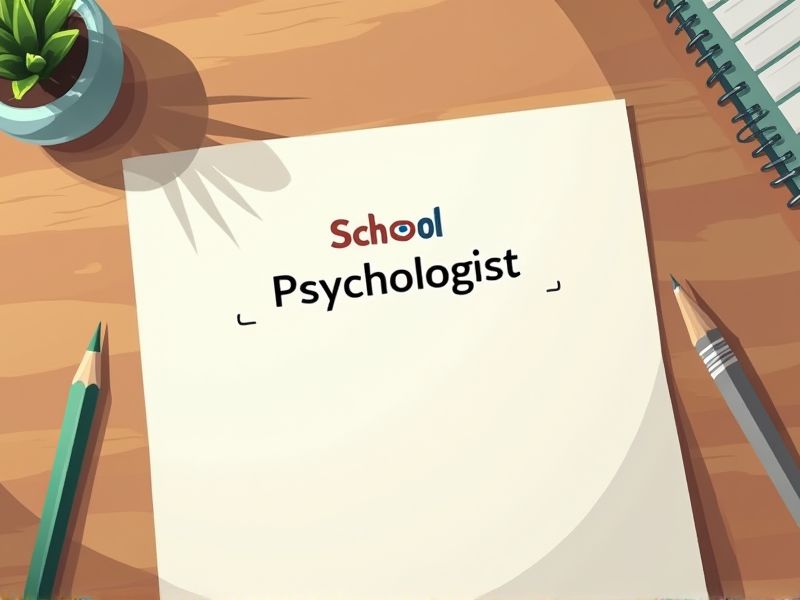
School psychologists play a crucial role in supporting students' learning and emotional well-being. Certifications ensure they possess the necessary expertise in child development, mental health, and educational assessment. Without proper certifications, school psychologists might lack the credibility and skills required to effectively address diverse student needs. Here are some important certifications you may need for a school psychologist.
Nationally Certified School Psychologist (NCSP)
The designation of Nationally Certified School Psychologist (NCSP) enhances the credibility of school psychologists by recognizing their adherence to national standards, ensuring they possess the necessary skills to support students effectively. The NCSP certification requires continuous professional development, which keeps school psychologists up-to-date with the latest research and methodologies, ultimately benefiting the educational environment. The certification can lead to increased funding opportunities for schools, as districts often prefer or require NCSP-certified professionals to meet grant requirements. School psychologists with NCSP credentials are more equipped to conduct comprehensive assessments and interventions, significantly improving student outcomes and overall school climate.
State School Psychologist Certification
State School Psychologist Certification is required to ensure psychologists meet standardized professional competencies essential for supporting students' mental health and learning. Certification helps maintain accountability and guarantees psychologists adhere to ethical and legal guidelines while working in educational settings. Without certification, the quality of psychological services may be inconsistent, potentially affecting the well-being and academic success of students. Certification serves as a safeguard, providing parents and educators assurance of the psychologist's qualifications and commitment to professional growth.
Mental Health First Aid Certification
School psychologists equipped with Mental Health First Aid Certification can effectively identify and address early signs of mental health issues in students, leading to timely interventions. This certification enhances their skills in providing initial support and guidance, fostering a safer and more supportive school environment. With an increase in mental health challenges among youth, possessing such certification ensures school psychologists are prepared to manage crises. Empirical evidence suggests that early identification and intervention can improve long-term psychological outcomes for students, highlighting the importance of this specialized training.
Crisis Prevention Intervention (CPI) Certification
CPI certification equips school psychologists with the skills to de-escalate potentially volatile situations, reducing risks of physical harm to both students and staff. Training in CPI fosters a safer school environment, aligning with policies that prioritize student well-being and safety. Certified psychologists are better prepared to handle crises, which can enhance the overall learning atmosphere. Understanding CPI methods supports legal compliance, protecting schools from liability issues associated with mismanaged incidents.
Board Certified Behavior Analyst (BCBA) Certification
Board Certified Behavior Analyst (BCBA) certification equips school psychologists with specialized skills in behavior assessment and intervention strategies, enhancing their ability to address diverse student needs effectively. The certification provides a structured framework for implementing evidence-based practices, critical for developing individualized education plans and supporting students with behavioral challenges. It ensures that school psychologists adhere to high ethical standards and practices validated by the behavior analysis field, fostering trust and reliability in their interventions. Having BCBA certification may open professional growth opportunities, as schools prioritize employing specialists with comprehensive training in behavioral analysis.
Applied Behavior Analysis (ABA) Certification
Certification in Applied Behavior Analysis (ABA) equips school psychologists with specialized skills to address diverse behavioral issues effectively. This certification ensures they can implement evidence-based interventions, which can lead to improved student outcomes. School psychologists with ABA training are better prepared to conduct functional behavior assessments, offering targeted support for students with behavioral challenges. Schools benefit from this expertise, as it promotes a structured approach to behavior management, enhancing the overall learning environment.
Suicide Prevention Training Certification
School psychologists with suicide prevention training certification are better equipped to identify early warning signs of suicidal behavior among students. This training enhances their ability to intervene effectively, providing immediate support and crisis management. Data shows a reduction in suicide attempts when schools proactively address mental health concerns through certified professionals. By having this certification, school psychologists can implement evidence-based prevention strategies, fostering a safer school environment.
Trauma-Informed Care Certification
Trauma-informed care certification equips school psychologists with the necessary skills to recognize and address trauma-related issues, improving students' emotional and psychological well-being. Students exposed to trauma often exhibit behavioral and learning challenges, and certified professionals can apply effective strategies to support these students' academic and social development. Schools implementing trauma-informed practices report a reduction in disciplinary incidents and an increase in student engagement, highlighting the need for trained psychologists. This certification helps align school practices with the latest research on trauma's impact on learning and development.
Child Abuse Recognition and Reporting Certification
Child Abuse Recognition and Reporting Certification equips school psychologists with the skills to identify signs of abuse, ensuring early intervention and support for affected children. Recognizing potential abuse quickly can mitigate long-term psychological damage, directly impacting a child's overall well-being and development. Reporting certified psychologists help fulfill legal obligations, reducing liabilities for educational institutions. Certification builds trust between school psychologists and families, fostering a safer and more supportive educational environment.
Special Education Professional Development Certification
School psychologists equipped with Special Education Professional Development Certification often demonstrate enhanced skills in identifying and addressing the varied needs of students with disabilities, due to specialized training. This certification typically results in a more comprehensive understanding of legal and ethical responsibilities, allowing school psychologists to navigate special education laws more effectively. Enhanced knowledge acquired through this certification enables them to tailor interventions and support strategies, directly influencing student success. They often become more integral to multidisciplinary teams, fostering better collaboration and more cohesive educational planning.
Summary
You can expect school psychologists to enhance their skills and offer improved mental health interventions when they obtain additional certifications. These certifications often provide them with advanced techniques in counseling, assessment, and behavioral interventions. Schools benefit from reduced behavioral issues and improved student outcomes as a result of the enhanced capabilities of certified psychologists. Such endorsements also lead to increased trust from educators and parents, elevating the psychologist's credibility and effectiveness.
